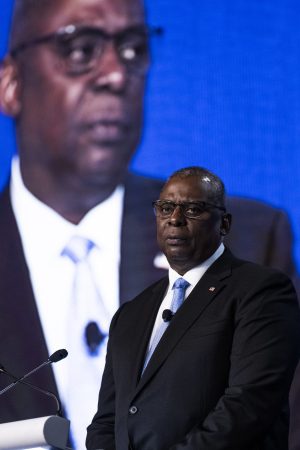Yesterday, Asia’s leading defense dialogue held after a two-year hiatus due to the COVID-19 pandemic came to an end in Singapore. Over the course of three days, the annual IISS Shangri-La Dialogue saw several dozen speeches, panels, and discussions on a wide range of issues. Most of these clustered around two dominant subjects – the war in Ukraine and growing competition between China and the United States – that featured in nearly every session of the three-day conference, which featured delegates from some 40 countries.
As expected, the conference’s scope was framed by the dueling headline speeches given by U.S. Defense Secretary Lloyd Austin and Chinese Defense Minister Gen. Wei Fenghe. The meeting between the two on Friday, their first face-to-face meeting since President Joe Biden’s inauguration in January 2021, offered some reassuring signs that the two sides’ security establishments are restoring direct communications at the highest levels. But in their subsequent speeches to the conference, Austin and Wei sparred with each other on a range of issues, from the status of Taiwan and the Russia-Ukraine war to the disputes in the South China Sea and the question of human rights.
During his speech on Saturday, Austin criticized China’s series of coercive and aggressive actions in the East and South China seas, which the said posed a threat to regional stability. He vowed the United States would stand by partners to resist Chinese pressure.
“Indo-Pacific countries shouldn’t face political intimidation, economic coercion, or harassment by maritime militias,” Austin said in his speech. “The PRC’s moves threaten to undermine security, and stability, and prosperity in the Indo-Pacific.”
This was followed on Sunday by a speech from Wei, who, in the characterization of the Straits Times, “sought to project an image of China as a peaceful rising power,” but also “peppered his speech with dire warnings to those who may provoke it.”
“The China-US relationship is at a critical and crucial juncture,” Wei said, in his speech, which offered a strident riposte to Austin’s address. “It is a historic and strategic mistake to take China as a threat or enemy. We call on the U.S. side to stop smearing and containing China, stop interfering in China’s internal affairs, and stop harming China’s interests.”
He added, “The bilateral relationship cannot improve unless the U.S. side can do that.”
Infusing the U.S.-China volleys with a degree or urgency and tension was the ongoing grinding conflict in Ukraine. Ukrainian President Volodymyr Zelenskyy spoke to the conference by videolink on Saturday, during which he warned delegates that despite Ukraine’s distance from Asia, Russia’s invasion of the country had global implications.
“Please remember that this support and this attention is not only for Ukraine but for you as well, to ensure that our and your future is safe,” he said. “It is on the battlefield in Ukraine that the future rules of this world are being decided along with the boundaries of the possible.” The unstated point of parallel here is with China’s ardent desire for “reunification” with Taiwan, a topic on which Wei also weighed with an ominous warning.
“If anyone dares to secede Taiwan from China – let me be clear – we will not hesitate to fight,” he said. “We will fight at all costs and we will fight to the very end.”
After the last Shangri-La Dialogue in 2019, The Diplomat’s Prashanth Parameswaran wrote that the conference had been “dominated by the subject of heightening U.S.-China competition.” The proceedings, he wrote, “did not provide much in the way of reassurance about the future trajectory of the relationship and only reinforced the sense that competition between the two powers is likely to linger thereafter.”
Three years later, the return of war to Eastern Europe has only added to the sense in which the world is pushing toward a point of rupture, and that the current U.S.-backed security order, for its various virtues and shortcomings, may have been irretrievably altered. As one observer put it, “the tone of this year’s Shangri-La Dialogue was not so much glass half empty as that of a vessel placed precariously close to the edge of a table, one small slip away from smashing to pieces.”

































